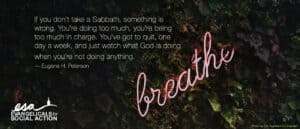
Editor’s Note: For the season of Lent, Ed Cyzewski has created a daily email list that shares quotes from Trappist monk and contemplative prayer author Thomas Merton. Each Friday here on ESA, Ed will share a few reflections on Merton’s wisdom for us today based on these readings.
The first time I attempted to pray in silence, I struggled to sit still for 15 minutes, saw no results, and then thought to myself, “Well, that didn’t work.”
As it turns out, writer and activist Thomas Merton had me pegged a few decades earlier:
“The reason why so many religious people believe they cannot meditate is that they think meditation consists in having religious emotions, thoughts, or affections of which one is, oneself, acutely aware. As soon as they start to meditate, they begin to look into the psychological conscience to find out if they are experiencing anything worthwhile. They find little or nothing. They either strain themselves to produce some interior experience, or else they give up in disgust.”
It’s challenging to switch from the active life of service to others, where goals and results are comparatively easier to set, measure, and complete, to the far murkier experience of prayer. How do we know our prayers are effective and not a complete waste of time? It’s tempting to think that we can accomplish more if we just cut silence or meditation out of our lives, since we can’t really see what they’re accomplishing. Perhaps we don’t “think” this per se, but our struggles to make space for prayer suggest that this may be a real issue for many of us.
It’s challenging to switch from the active life of service to others, where goals and results are comparatively easier to set, measure, and complete, to the far murkier experience of prayer.
Perhaps one of the most helpful starting points in finding space for prayer in the midst of our service to others is to consider where the desire to pray comes from.
God Inspires Us to Pray
“The only thing to seek in contemplative prayer is God; and we seek Him successfully when we realize that we cannot find Him unless He shows Himself to us, and yet at the same time that He would not have inspired us to seek Him unless we had already found Him.”
Thomas Merton writes that entering into prayer is a response, not a starting point. God has already initiated the desire for prayer, for communion and connection. We receive prayer as a gift from God, and this grace given to us will expand and shift as God permits.
Perhaps we imagine that a particular kind of prayer experience will help us, but that betrays a desire for control over our relationship with God. Prayer can be freeing, even renewing, if we surrender to God and receive what God offers.
If we can enter into prayer as both a gift from God and a grace, we can accept that prayer also saves us from thinking too much of ourselves.
Prayer Prevents Us from Being the Heroes
“One cannot then enter into meditation… without a kind of inner upheaval. By upheaval I do not mean a disturbance, but breaking out of routine, a liberation of the heart from the cares and preoccupations of one’s daily business.”
A pastor once shared with me that he realized the greatest mistake he could make in his church was believing that he was personally essential for the ministry. As a challenging season loomed over the church, he found that he needed to routinely step back and trust God to work in the church community. At one particularly critical moment, he invited the staff to sit in a circle in silence before God together. After a time of seeking God’s guidance, they found that God gave them clarity in making some important decisions.
Although this pastor felt a burden to have all the answers and propose the solutions that would show the way forward, he was liberated by stepping back and trusting God to work. He found in a very practical way that the gift of the Spirit could guide his church community forward through prayer.
This same gift belongs to each Christian.
God Is Already Present When We Pray
“By virtue of this hidden presence of the Spirit in our inmost self, we need only to deliver ourselves from preoccupation with our external, selfish, and illusory self in order to find God within us. And the Lord has explicitly said that this discovery, a sublime gift of His grace, normally implies some form of spiritual experience.”
Prayer does not summon God to come and be present with the church, Thomas Merton writes. In addition, a spiritual experience or mountaintop moment is not necessary to prove God’s presence or to validate the faith of those who pray.
The Spirit is already promised to God’s people. However, the gift of the Spirit can remain hidden through our illusions, worries, or desires. A prayer experience that lacks the emotions or feelings of connection to God does not invalidate the promise of Jesus to send the Spirit among us. Oftentimes, the Spirit is obscured, overlooked, or simply waiting to be noticed.
A prayer experience that lacks the emotions or feelings of connection to God does not invalidate the promise of Jesus to send the Spirit among us.
I have often made the mistake of overestimating my own wisdom and abilities while underestimating the presence and power of God in my life. My entanglements with illusions and misplaced expectations often interrupt the flow of God’s Spirit in my life. Prayer is a gift that I can’t lose and that no one can take away from me, but I can misunderstand the signs of God’s presence or the “effectiveness” of prayer.
Rather than turning prayer into a simple cost/benefit analysis or a test of our worthiness before God, grace encourages us to make the space for prayer, to become fully present for God, and to trust that God will guide us as we take our next steps toward action.
 Ed Cyzewski is the author of Flee, Be Silent, Pray: Ancient Prayers for Anxious Christians, A Christian Survival Guide: A Lifeline to Faith and Growth, and other books. He writes weekly at This Kinda Contemplative Life at Patheos, and he lives in Western Kentucky with his wife and children.
Ed Cyzewski is the author of Flee, Be Silent, Pray: Ancient Prayers for Anxious Christians, A Christian Survival Guide: A Lifeline to Faith and Growth, and other books. He writes weekly at This Kinda Contemplative Life at Patheos, and he lives in Western Kentucky with his wife and children.


